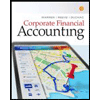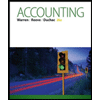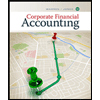
CONNECT ONLINE ACCESS FOR INTERMEDIATE
10th Edition
ISBN: 9781264798834
Author: SPICELAND
Publisher: MCG
expand_more
expand_more
format_list_bulleted
Concept explainers
Question
Chapter 2, Problem 2.3BE
To determine
Accounting Cycle:
Accounting cycle refers to the process of recording a business transaction in the books of accounts. This cycle concludes when the financial statements are prepared.
T-account:
- T-account is the form of the ledger account, where the
journal entries are posted to this account. It is referred to as the T-account, because the alignment of the components of the account resembles the capital letter ‘T’. - The components of the T-account are as follows:
-
- a) The title of the account
- b) The left or debit side
- c) The right or credit side
To Post: The prepared journal entries to the T-accounts.
Expert Solution & Answer
Want to see the full answer?
Check out a sample textbook solution
Students have asked these similar questions
Hello tutor please given General accounting question answer do fast and properly explain all answer
Compute the unit contribution margin of this accounting question
Please answer the following requirements on these general accounting question
Chapter 2 Solutions
CONNECT ONLINE ACCESS FOR INTERMEDIATE
Ch. 2 - Explain the difference between external events and...Ch. 2 - Each economic event or transaction will have a...Ch. 2 - What is the purpose of a journal? What is the...Ch. 2 - Explain the difference between permanent accounts...Ch. 2 - Describe how debits and credits affect assets,...Ch. 2 - Describe how debits and credits affect temporary...Ch. 2 - What is the first step in the accounting...Ch. 2 - Prob. 2.8QCh. 2 - Prob. 2.9QCh. 2 - Prob. 2.10Q
Ch. 2 - What is an unadjusted trial balance? An adjusted...Ch. 2 - Define adjusting entries and discuss their...Ch. 2 - Define closing entries and their purpose.Ch. 2 - Define prepaid expenses and provide at least two...Ch. 2 - Deferred revenues represent liabilities recorded...Ch. 2 - Define accrued liabilities. What adjusting journal...Ch. 2 - Prob. 2.17QCh. 2 - [Based on Appendix A] What is the purpose of a...Ch. 2 - [Based on Appendix B] Define reversing entries and...Ch. 2 - [Based on Appendix C] What is the purpose of...Ch. 2 - Prob. 2.21QCh. 2 - Transaction analysis LO21 The Marchetti Soup...Ch. 2 - Journal entries LO22 Prepare journal entries for...Ch. 2 - Prob. 2.3BECh. 2 - Journal entries LO22 Prepare journal entries for...Ch. 2 - Adjusting entries LO25 Prepare the necessary...Ch. 2 - Adjusting entries; income determination LO24,...Ch. 2 - Prob. 2.12BECh. 2 - Journal entries LO22 Prepare journal entries to...Ch. 2 - T-accounts and trial balance LO23 Post the...Ch. 2 - Prob. 2.5ECh. 2 - Debits and credits LO22 Indicate whether a debit...Ch. 2 - Prob. 2.7ECh. 2 - Prob. 2.8ECh. 2 - Reversing entries Appendix 2B The employees of...Ch. 2 - Special journals Appendix 2C The White Companys...Ch. 2 - Prob. 2.24ECh. 2 - Prob. 2.3PCh. 2 - Prob. 2.4PCh. 2 - Prob. 2.8PCh. 2 - Prob. 2.12PCh. 2 - Judgment Case 21 Cash versus accrual accounting;...Ch. 2 - Communication Case 23 Adjusting entries LO24 I...Ch. 2 - Prob. 2.1DA
Knowledge Booster
Learn more about
Need a deep-dive on the concept behind this application? Look no further. Learn more about this topic, accounting and related others by exploring similar questions and additional content below.Similar questions
- Financial Accountingarrow_forwardTwo investors are evaluating Anywhere e-SIM Ltd.’s stock for possiblepurchase. They agree on the expected value of D1 and also on theexpected future dividend growth rate. Further, they agree on theriskiness of the stock. However, one investor normally holds stocksfor 2 years, while the other normally holds stocks for 10 years.Is it true that they should both be willing to pay the same price forthis stock? Explain based on how stocks are valued and provide anumerical example to support your arguments.arrow_forwardPlease need answer the accounting questionarrow_forward
arrow_back_ios
SEE MORE QUESTIONS
arrow_forward_ios
Recommended textbooks for you
 Corporate Financial AccountingAccountingISBN:9781305653535Author:Carl Warren, James M. Reeve, Jonathan DuchacPublisher:Cengage Learning
Corporate Financial AccountingAccountingISBN:9781305653535Author:Carl Warren, James M. Reeve, Jonathan DuchacPublisher:Cengage Learning AccountingAccountingISBN:9781337272094Author:WARREN, Carl S., Reeve, James M., Duchac, Jonathan E.Publisher:Cengage Learning,
AccountingAccountingISBN:9781337272094Author:WARREN, Carl S., Reeve, James M., Duchac, Jonathan E.Publisher:Cengage Learning, Accounting (Text Only)AccountingISBN:9781285743615Author:Carl Warren, James M. Reeve, Jonathan DuchacPublisher:Cengage LearningCentury 21 Accounting Multicolumn JournalAccountingISBN:9781337679503Author:GilbertsonPublisher:Cengage
Accounting (Text Only)AccountingISBN:9781285743615Author:Carl Warren, James M. Reeve, Jonathan DuchacPublisher:Cengage LearningCentury 21 Accounting Multicolumn JournalAccountingISBN:9781337679503Author:GilbertsonPublisher:Cengage Corporate Financial AccountingAccountingISBN:9781337398169Author:Carl Warren, Jeff JonesPublisher:Cengage Learning
Corporate Financial AccountingAccountingISBN:9781337398169Author:Carl Warren, Jeff JonesPublisher:Cengage Learning

Corporate Financial Accounting
Accounting
ISBN:9781305653535
Author:Carl Warren, James M. Reeve, Jonathan Duchac
Publisher:Cengage Learning

Accounting
Accounting
ISBN:9781337272094
Author:WARREN, Carl S., Reeve, James M., Duchac, Jonathan E.
Publisher:Cengage Learning,


Accounting (Text Only)
Accounting
ISBN:9781285743615
Author:Carl Warren, James M. Reeve, Jonathan Duchac
Publisher:Cengage Learning

Century 21 Accounting Multicolumn Journal
Accounting
ISBN:9781337679503
Author:Gilbertson
Publisher:Cengage

Corporate Financial Accounting
Accounting
ISBN:9781337398169
Author:Carl Warren, Jeff Jones
Publisher:Cengage Learning